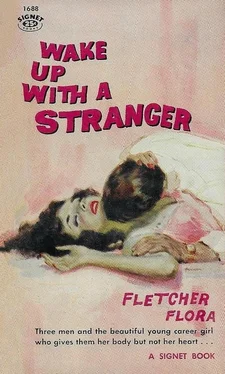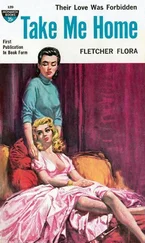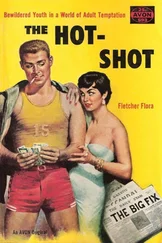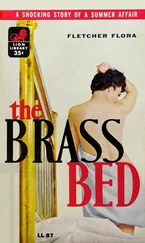But it was not Enos. It was a slender man, almost slight, neatly dressed in a dark brown suit with brown shoes and a brown knit tie, and he held in his right hand a brown hat that had covered, before he removed it, a head of short-cut light brown hair. At first she could not place him, though he seemed familiar, and then she remembered who he was, but she still couldn’t remember his name, and this was possibly because it was a name she preferred not to remember.
“Good evening, Miss Buchanan,” he said. “Do you remember me?”
“I remember who you are,” she said, “but I don’t remember your name.”
“It’s Daniels. The last time we met, which was also the first, I said that I would enjoy seeing you again, but we agreed that it would be impossible.”
“Apparently we were wrong.”
“Yes. Apparently. I hope you are not distressed about it.”
“Why should I be? Are you here on police business?”
“In a way I am. In a way I’m not. The fact is, I’m delivering mail.”
“What do you mean?”
“I mean that I have a letter for you. A note. May I come in for a few minutes?”
“If it’s necessary.”
“I regret that it is.”
She stepped back and aside, still holding to the knob of the door. It was something of consequence, of course, that brought him here at this hour, and the chances were that it was unpleasant or possibly disastrous, though she couldn’t think what it might be. What surprised her even more than his presence was the quiet readiness with which she would surely accept whatever it was that brought him. She watched him come past her into the room, feeling in her readiness a certain pride.
“Won’t you sit down?” she said.
“Thank you.”
He drifted across to the chair in which she had been sitting. Seeing her book, which was turned face down on the chair’s arm, he turned toward her with the thin smile that she remembered well, now that she saw it again.
“I see that you are reading The Sleepless Moon,” he said.
“Yes.”
“I haven’t read it yet myself, but I’ve read a review. In the Atlantic, I think.”
“The Atlantic?”
The question had an inflection of skepticism, and she regretted it as soon as it was spoken, not so much because it was a rudeness to him as because it suggested in her a naive snobbishness that discredited automatically the claim of a policeman to read anything superior to comic books. Sensitive to the inflection, he permitted his smile to return briefly.
“Anyhow,” he said, “I’m sure you have no desire to discuss books with me at this hour of the night, or any hour at all. As I said, I have brought you a note, and here it is.”
He took an envelope from his coat pocket and handed it to her, and she took it and looked at it, and there was nothing on the outside except her name. She had not seen Enos Simon’s handwriting for years, not since the letters from college, and she didn’t recognize it. But she knew just the same that the letter was from Enos and that he had written to her before dying and was by this time surely dead. This was knowledge that involved her awareness of the possibility, plus the presence of Daniels, and it was incontrovertible. Removing the note from the envelope, she read it quickly, the few lines, the simple statement of regret and gratitude.
It is too bad, she thought, that he felt this way in the end. If only he had abused me or cursed me or made some kind of indictment, it would now be better and easier for me. He was weak or sick and in a very real sense a coward, though it was something he could in no way help, and if he has now killed himself, which he obviously has, it is because of these things and because he was simply not fit to live, and there is no good reason at all why I should hold myself responsible or be disturbed beyond the demands of compassion and natural sorrow, but I wish to God in all reverence that he had blamed me and cursed me and wished me dead instead of himself, for this would be something I could hold in contempt and soon forget, but I can never forget what he has written, not so long as I live, and he has done me after all the most harm that he could do.
“So he has killed himself,” she said.
“Yes. He cut his wrist with a razor blade and bled to death.”
“I’m sorry, but I’m not particularly surprised.”
“Aren’t you? Why not?”
“Because he was a depressive. He went into the deepest despair over the slightest things, and he had absolutely no capacity for solving his problems.”
“Well, some of us are like that, I understand. Did you know him long?”
“I knew him for several months a good many years ago. When we were kids. We met again this year and became friends again, but I have not seen him for about three weeks.”
“Why not?”
“Primarily for the reasons I have indicated. He was not a person you could be casual with indefinitely. He became quite difficult.”
“I see. Did you anticipate his suicide specifically?”
“Not specifically, nor particularly as a consequence of our relationship, if that’s what you mean. It was merely something he might have done, for this reason or that, at one time or another.”
“In fact, it was something he was almost bound to do. Is that right?”
“I think so.”
“All right. So he did. He has committed suicide, as palpably as Mr. Burns died earlier this year of a heart attack, and that seems to be the end of it. It is only coincidental, of course, that you have been concerned in both instances — and I also, in a lesser way.”
“Yes. Of course.”
He looked at her without saying anything, and she folded the sheet of paper and returned it to the envelope and held it out to him. He smiled his thin smile and executed a small gesture of rejection.
“I thought you might like to keep it,” he said.
“Don’t the police like to retain things of this sort?”
“Only when they are evidence of something or other that concerns us. In this case, there doesn’t seem to be any indication of that.”
“Will it be necessary to give it any publicity?”
“The letter? Not adversely, at any rate. Certainly it can’t be published so long as it is in your possession.”
“Thank you.”
“Not at all. And now I have intruded long enough. Good night, Miss Buchanan.”
“Good night,” she said.
He walked past her to the door and turned without opening it, and it was the last time that she saw his thin smile.
“When I left you about three months ago,” he said, “I wished that I could see you again. Now I wish that I may never see you again on earth. The complications seem altogether too deadly.”
He opened the door then and went out, and she turned and crossed the room to a table on which there was a glass ash tray and a package of paper matches. She set fire to Enos Simon’s note with one of the matches and watched it burn to black ash in the glass tray. It was, in a way, like burning Enos himself. Like burning his body. As Aaron had burned to begin it, so Enos to end it.
Why did Daniels say that? she thought. Damn him to hell, why did he say it? Certainly it is altogether absurd to think that I am, without wanting or trying to be, a kind of carrier of misfortune and death.
She looked at her watch and read the time.
In an hour and a half, she thought, it will be time for Tyler.












